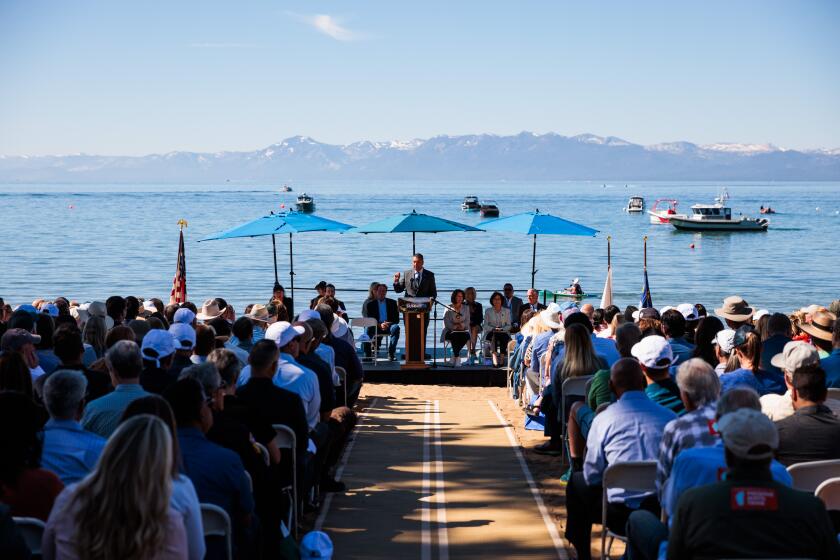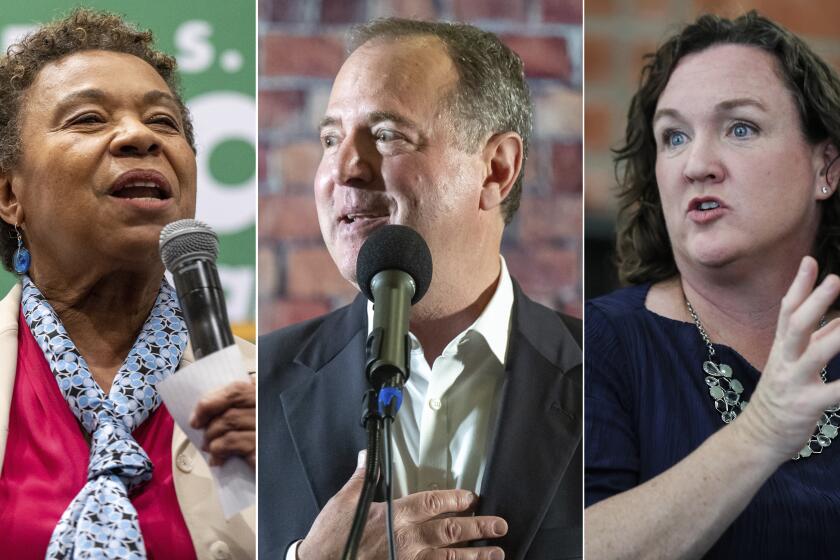Schiff and Porter increasingly dominate race for Senate, poll shows

California has more registered Republicans than any state in the union, but that doesn’t mean one of them will make it to the runoff for the state’s U.S. Senate seat.
Six months ahead of the March 5 primary, two Democrats appear likely to face off next year to decide who will replace longtime Democratic Sen. Dianne Feinstein, according to a new UC Berkeley Institute of Governmental Studies poll co-sponsored by The Times.
The prospect of Steve Garvey, the former Dodger and Padres legend, entering the race as a high-profile Republican hasn’t scrambled that dynamic, the poll found.
Reps. Adam B. Schiff of Burbank and Katie Porter of Irvine are neck and neck, with support from 20% and 17% of likely voters, respectively, the poll found. The two have opened up sizable leads over their other prominent Democratic opponent, Rep. Barbara Lee of Oakland, who sits at 7%.
Garvey, who has not announced whether he will run, and Republican businessman James Bradley each also had 7% support in the poll. Attorney Eric Early, a perennial GOP candidate, sits at 5%. Roughly a third of likely voters surveyed said they were undecided.
Under California’s top-two system, the two candidates with the most votes in the primary, regardless of party affiliation, advance to the general election.
“The more Republicans there are [in the race], the lower their chances are of getting somebody in the top two, just because they divide each other’s support up,” said Mark DiCamillo, director of the Times-Berkeley poll and a longtime California pollster.
“You can change that with a lot of campaigning, but they don’t appear to be that competitive right now for the top two positions,” he added.
The GOP’s Early was favored by 18% of likely voters in a Times-Berkeley poll in May but saw his support plummet through the summer. In that survey, Porter was close behind him with 17% support, followed by Schiff with 14% and Lee at 9%.
Garvey was not included in the previous poll but has been weighing entering the race all summer, his advisor Andy Gharakhani said. “Steve is seriously considering entering this race and speaking directly with voters on the issues they care most about,” Gharakhani said.
Despite several months of campaigning, Lee remains less well-known than Schiff and Porter, with half of likely voters having no opinion of her. Although she is the only Black candidate in the race, she trails among likely Black voters with 16% support, behind Schiff’s 30% and Porter’s 21%.
One factor that has the potential to shake up the race is whether Feinstein will be able to finish her term in office. She was hospitalized with shingles for a week starting in late February. The illness kept her in San Francisco for months. The dozens of Senate votes she missed, including several on judges, led some in her party, including Rep. Ro Khanna of Fremont, to call on her to step aside.
Last month, she was hospitalized again after falling in her San Francisco home.
Sen. Dianne Feinstein, 90, missed a summit about Lake Tahoe’s health, which she helped start. Still her legacy and contributions to the region took centerstage.
If Feinstein were to leave before the end of her term, Gov. Gavin Newsom would need to appoint a temporary replacement. After he appointed a man to fill the former Senate seat of Vice President Kamala Harris, the governor committed to picking a Black woman if Feinstein’s seat were to become vacant.
Newsom hasn’t endorsed anyone in the Senate race, but some supporters of Lee have said he should appoint her if the seat opens up.
Asked what Newsom should do if Feinstein steps down, 51% of likely voters said the governor should appoint someone who is prepared to run for a full Senate term in the 2024 election.
A quarter of likely voters said he should appoint someone who is willing to serve as an interim appointee and not run for a full term. The rest had no opinion.
Schiff and Porter have remained mum on that issue, simply wishing Feinstein the best in her recovery.
The three most prominent Democrats running for Senate in California all want to expand the Supreme Court, a preview of what’s to come across the country.
The race between Schiff, a former prosecutor who was first elected to the House in 2000, and Porter, a UC Irvine law professor who was first elected in 2018, is shaping up to be a generational clash.
Likely voters older than 65 favor Schiff over Porter, 29% to 12%, the poll found. Those younger than 50 tend to favor Porter: She leads Schiff 23% to 14% among likely voters 30-39 and 27% to 6% among those 18-29.
That could pose a problem for Porter: She does best among those who, while considered likely to submit a ballot, often don’t show up at election time. A recent Berkeley Institute of Governmental Studies analysis of voting in the state found that habitual voters tend to be white and older than the average Californian. Frequent voters were also disproportionately over the age of 50.
But the fact that the election is taking place in a presidential year could mitigate that disadvantage, said Sara Sadhwani, a professor of politics at Pomona College.
“One of the things about younger voters ... that we tend to see is an increase in turnout in a presidential election year,” she said.
Rep. Adam Schiff is using the prominence of being a top antagonist of former President Trump to great effect in his bid for election to the Senate.
Porter has done an excellent job during committee hearings of creating viral moments that appeal to younger voters on social media, Sadhwani said. The question, though, is whether those voters will show up for the primary in March.
Schiff has leveraged his prominent role as a top antagonist of former President Trump to boost his Senate run. That appears to be paying off with some Democratic voters. He won additional attention when GOP House Republicans voted to censure Schiff for, in their view, going to too far in his efforts against Trump — a reprimand that Schiff has described as a badge of honor.
“It was an opportunity for Schiff again to remind voters in California about the important role that he has played in attempting to save our democracy,” Sadhwani said, adding that Republican House Speaker Kevin McCarthy had only “helped amplify that profile” with the censure vote.
Schiff is by far the best-known candidate in the field, with only 24% of likely voters not having an opinion of him. He got favorable views from 43% of likely voters polled, while 32% had an unfavorable view.
Porter is less known, with 43% of likely voters saying they had no opinion of her, 38% saying they liked her and 19% saying they had an unfavorable view of her.
She leads among voters in Orange County, where she lives, but Schiff leads in the San Francisco Bay Area. The two are neck and neck in Los Angeles and elsewhere in the state.
The fact that both leading Democrats are from Southern California is a shift from the state’s previous pattern, noted Chris Lehane, chief strategy officer at Haun Ventures, who previously was an advisor to Gov. Gray Davis and Vice President Al Gore.
“Historically, Democratic primaries were won by a Democrat in the north over the Democrats in the south,” Lehane said. “I think it’s a real question of whether that’s still the case.”
“When you think about 30 years ago when Feinstein first ran, it was a purple state. Now it’s a deep-blue state. Everything has become nationalized,” he added. “It looks like there no longer is the Giants vs. Dodgers dynamic.”
Schiff leads Porter 31% to 26% among registered Democrats surveyed. Among likely voters who identify as strong Democrats, he leads her 35% to 27%.
The two are essentially tied among voters who are registered without a party preference or as members of a smaller party.
The Berkeley institute’s poll surveyed 6,030 registered California voters online in English and Spanish, Aug. 24-29, including a weighted subsample of 3,113 considered likely to vote in the March primary.
Because the survey results are weighted to match census and voter registration benchmarks, estimates of the margin of error may be imprecise; however, the results for the likely voter sample are estimated to have a margin of error of 2.5 percentage points in either direction.
More to Read
Get the L.A. Times Politics newsletter
Deeply reported insights into legislation, politics and policy from Sacramento, Washington and beyond. In your inbox three times per week.
You may occasionally receive promotional content from the Los Angeles Times.














